Decking: An Ultimate Guide
Installing decking boards is a fantastic way to transform your outdoor space into a stylish, functional retreat. Whether you're creating a sun-soaked platform for lounging or a shaded space for evening entertaining with decking lights, a well-designed deck can dramatically enhance your garden. From planning your layout to learning how to clean decking, this comprehensive guide answers your most common decking questions as the landscaping season begins.
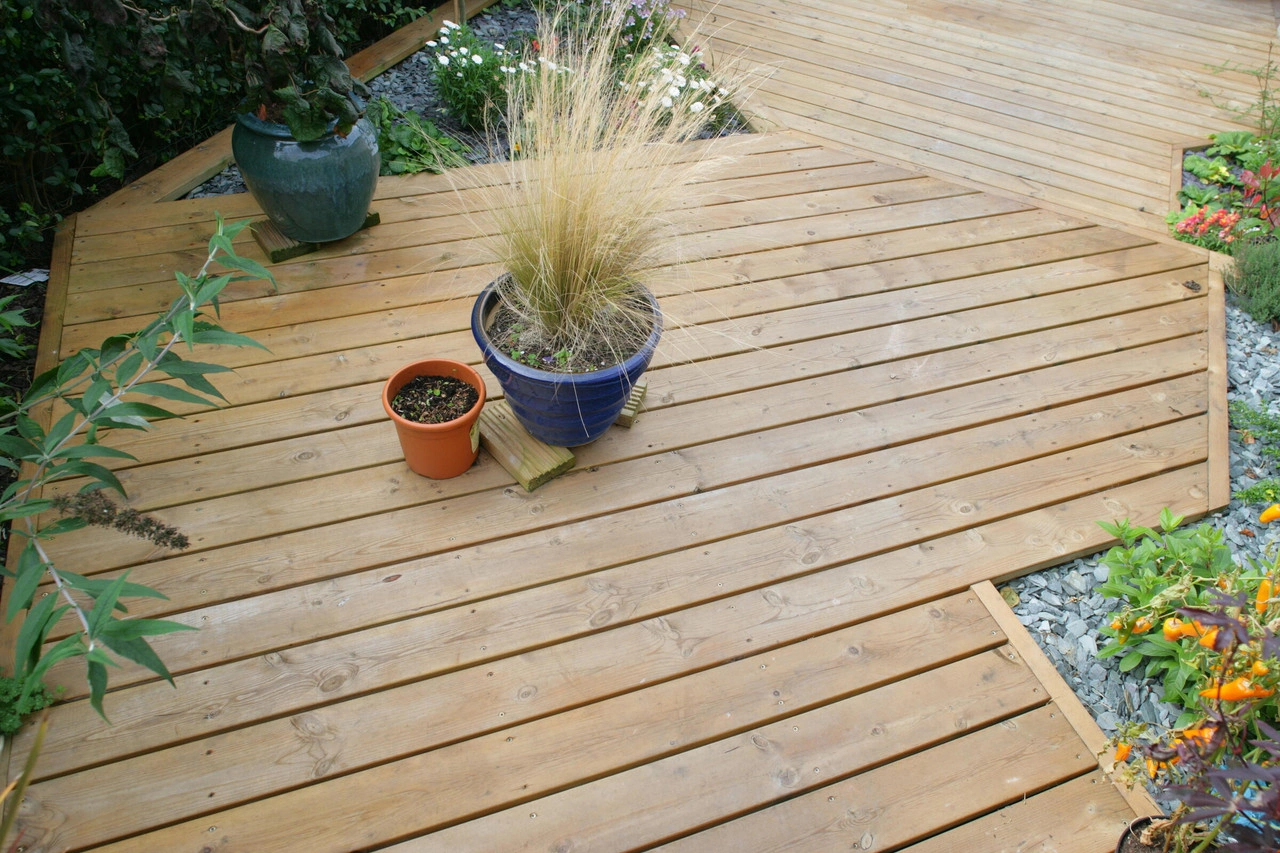
How to build a deck
Step 1: Before You Build
Before laying a single deck board, make sure your space is suitable. Check that your chosen site meets installation standards, particularly if you're attaching decking to your home. Avoid blocking air bricks or damp-proofing layers and ensure drains remain accessible. If you're planning around trees, leave enough space for growth.
You’ll also need to determine whether planning permission or building regulations apply. When in doubt, consult your local authority before starting your decking project.
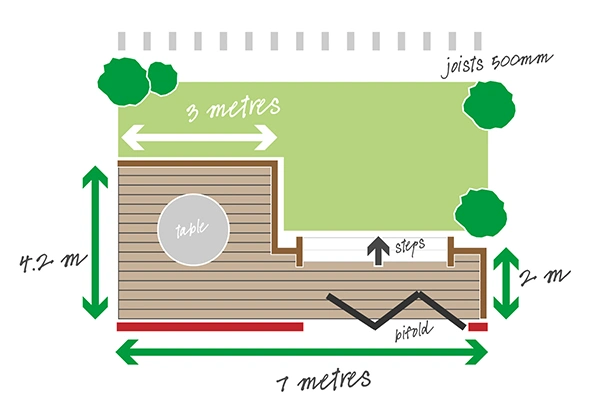
Step 2: Planning the design
Start by sketching a design. Outline the proposed boundary using battens and measure the layout, including house walls, air bricks, manholes, and other obstacles. Use a decking calculator to estimate how many decking boards you’ll need.
Consider using a decking kit to simplify the process, especially for rectangular or square builds. Don't forget to factor in extras such as decking screws, decking stain, or even decking paint if you're planning a unique finish.
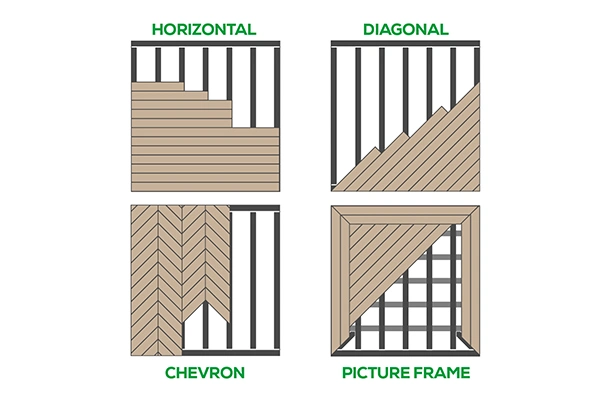
Step 3: Preparing the ground
Level the ground using a spirit level on a straight edge (a decking board works perfectly). If the area is grassy, dig down around 50mm to allow room for base materials.
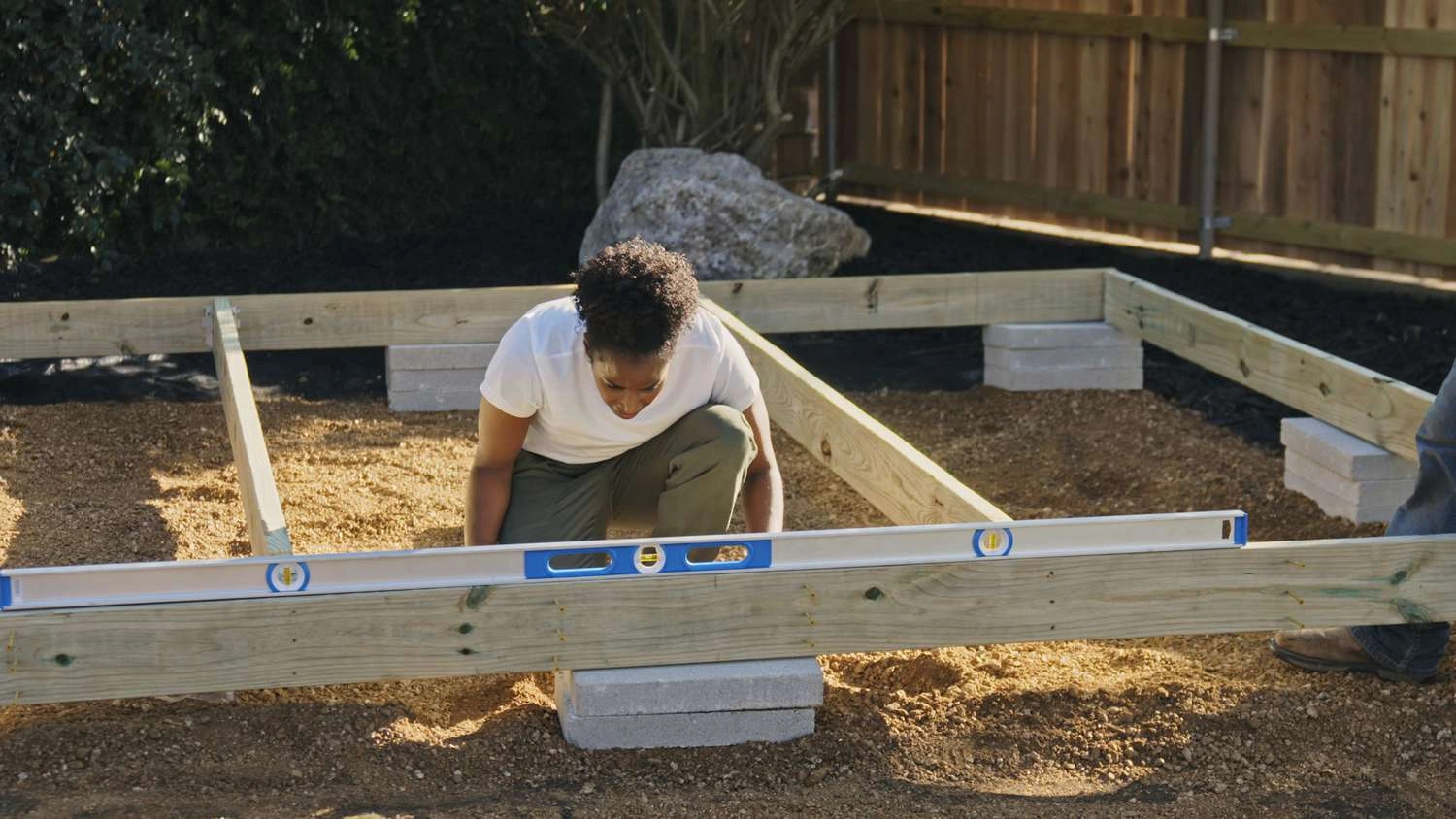
The Spruce
Step 4: Installation Option
You can install decking either on soil or on concrete pads. For soil installations, lay a weed-proof membrane followed by 40–50mm of gravel. This will help with drainage and prevent weeds.
For greater longevity, consider laying decking over existing concrete or patio slabs. This method helps keep moisture away from the wooden sub-frame, extending its life and reducing the need for frequent decking oil treatments.
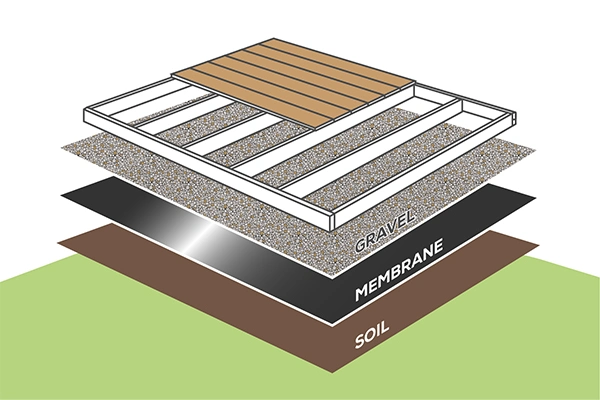
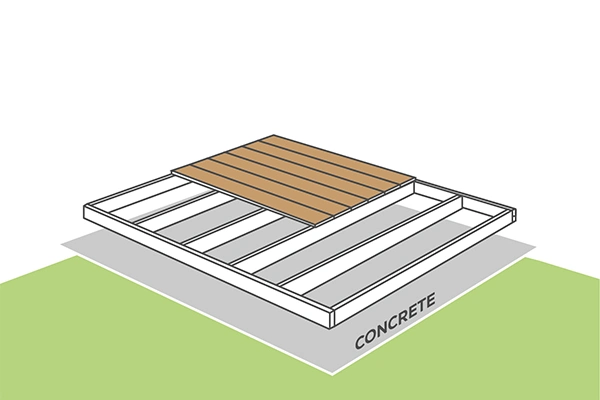
Step 5: Creating the sub-frame
Before making anything permanent, dry-lay your decking boards to test spacing and fit. Leave expansion gaps (5–8mm along the length, 3mm at ends). Then:
-
Cut decking to fit the layout.
-
Mark your frame’s joists and drill countersunk pilot holes.
-
Fix the joists using decking screws and coach bolts.
-
Ensure joist centres are no more than 450mm apart for horizontal boards.
Now your perimeter frame is ready!
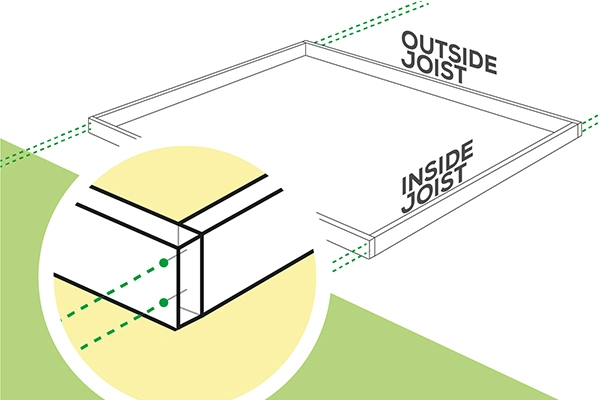
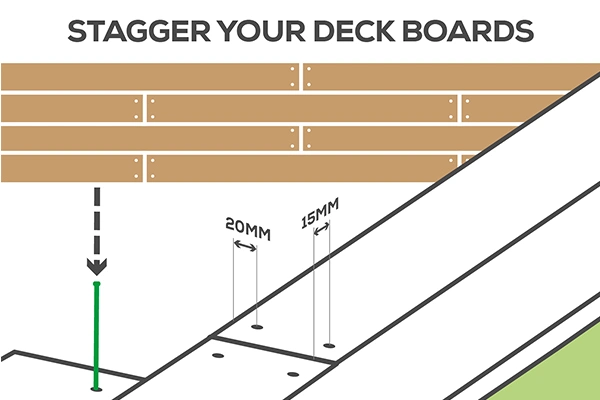
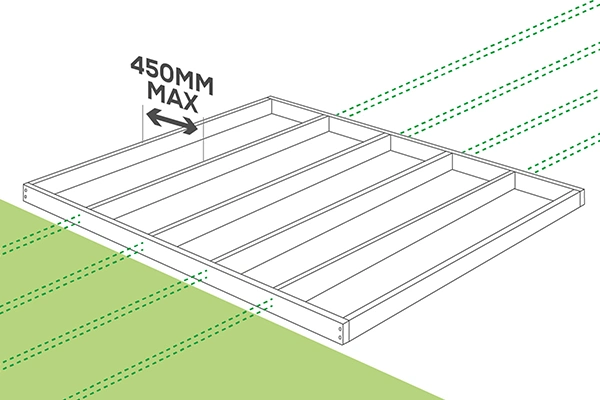
How to Lay Decking Boards
Step 6: Cutting the deck boards
Measure, mark, and cut each deck board precisely. Always clamp your board securely before cutting, and apply end-grain treatment after cutting to protect the wood.
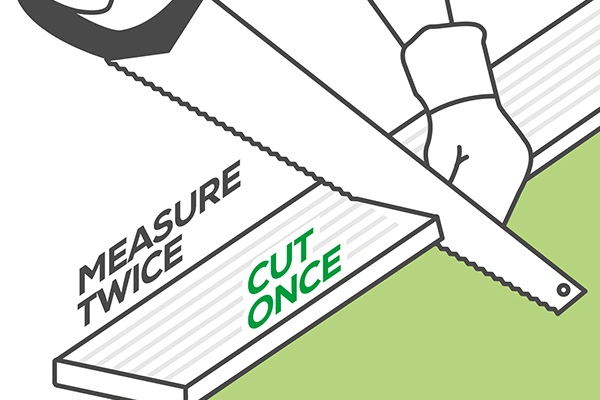
How to lay decking
Step 7: Laying the Deck Boards
-
Start at the outer edge and lay decking boards perpendicular to joists.
-
Cut around any posts, and ensure edges are flush.
-
Use two decking screws per joist, placed 15mm from the end and 20mm from each edge.
-
Leave expansion gaps and stagger board joints for extra strength.
Once laid, seal exposed cuts with a preserver, and sand any rough ends. After 4–6 months of weathering, your decking will be ready for decking oil, decking stain, or even a coat of decking paint to add colour and protect the surface.
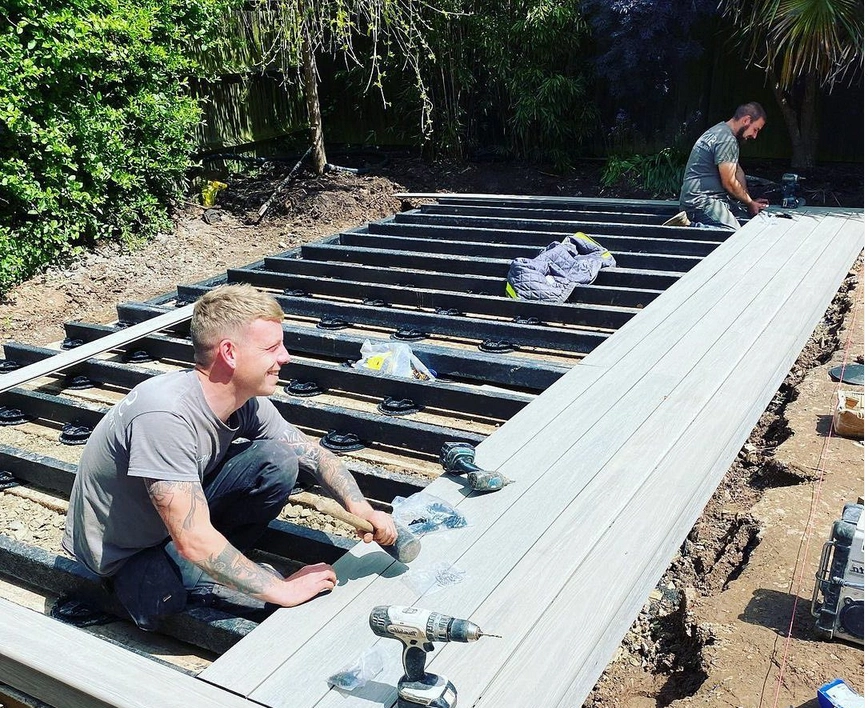
@envirobuild
And there you have it, a completely constructed deck in your garden!
It's critical to finish the deck to meet your requirements, so sand down all the cut ends with sandpaper and seal them with an end grain preserver. This keeps moisture from entering the wood and distorting or splitting it.
Normally, new decking is pre-treated; nevertheless, watch for a green or brown tint, or for the surface of your deck to be somewhat darker than the cut end. New decking should be left alone so that the weather may naturally climatize and balance it.
After a period of 4-6 months, you can then apply a new treatment or coat, but always check the coatings manufacturers’ instructions on the product on their website first. If desired, you may even go in with some decking paint to modify the appearance of the decking to your liking.
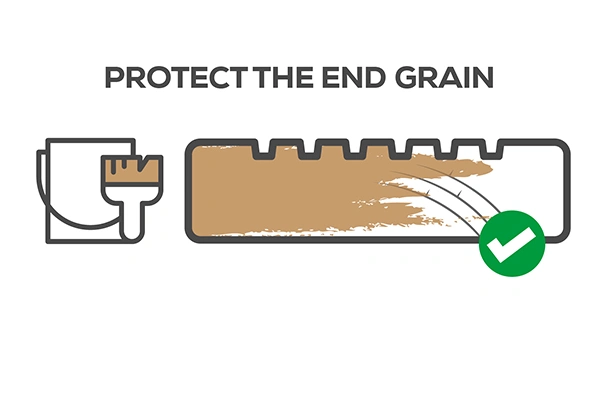
How to clean decking
Once you have constructed a deck in your garden, you may find it needs special care and attention to keep it in good condition. Fortunately, deck maintenance does not have to be complicated. You can completely alter the appearance of your decking with the correct deck cleaning solutions – and keep it functional for years to come.
Step 1: Prep the Area
Remove furniture, pots, and accessories. Sweep away leaves, dirt, and debris from between deck boards using a stiff brush.
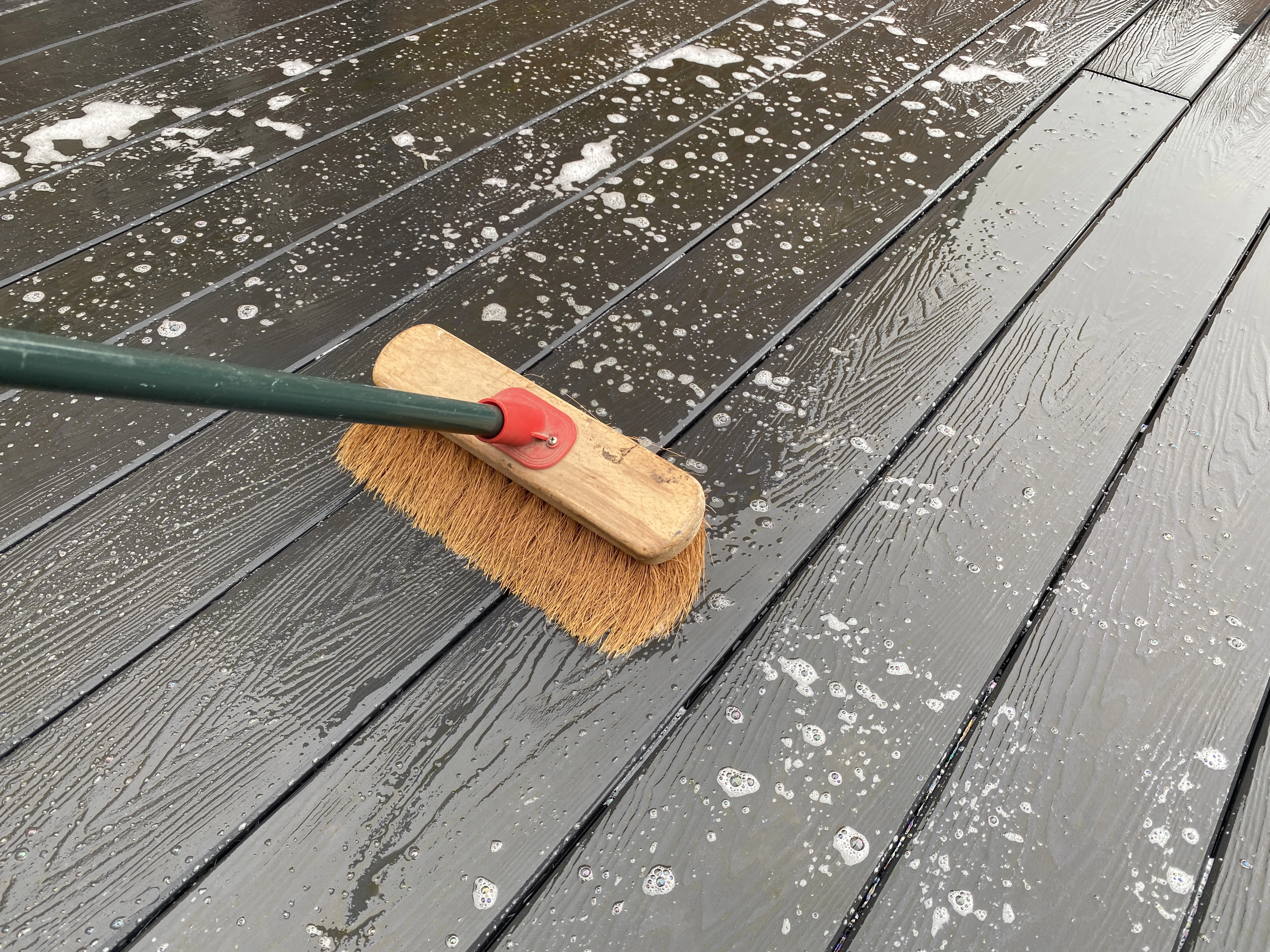
Homebuilding & Renovating
Step 2: Hose or pressure wash
Use a hose or power washer to clear grime. Be cautious with pressure washers—high settings can damage wood. Rinse between decking boards thoroughly.
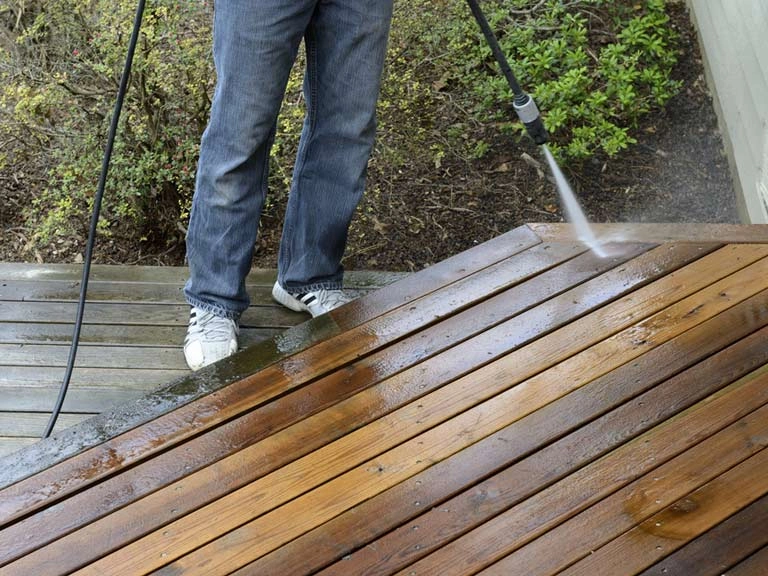
Saga
Step 3: Scrub and rinse
Mix a mild soapy solution or use a dedicated decking cleaner. Scrub the surface with a brush and leave the solution to work for 5–10 minutes, then rinse.

Love the Garden
Step 5: Reseal the Deck
Once dry, reapply a protective finish. This might be decking oil, a UV-resistant deck stain, or even a weather-resistant decking paint depending on your preference.
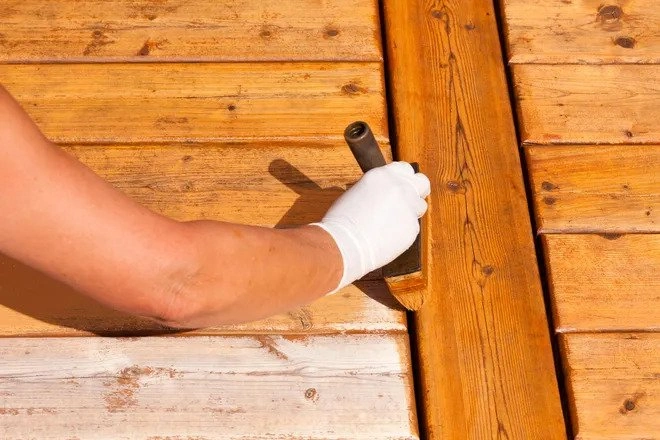
Cjonline
How to clean composite decking
Composite decking boards are made from recycled wood fibres and plastics, meaning they're low maintenance and resistant to rot. Here's how to clean them:
-
Sweep and remove debris from your composite deck boards.
-
Mix warm water with mild soap and scrub using a soft-bristled brush.
-
Clean in shaded sections if the deck is in direct sunlight to avoid soap drying.
-
Rinse thoroughly to remove all residue.
Composite decking is durable, but a yearly clean is still essential. You can use a low-pressure washer, but always follow manufacturer guidance.
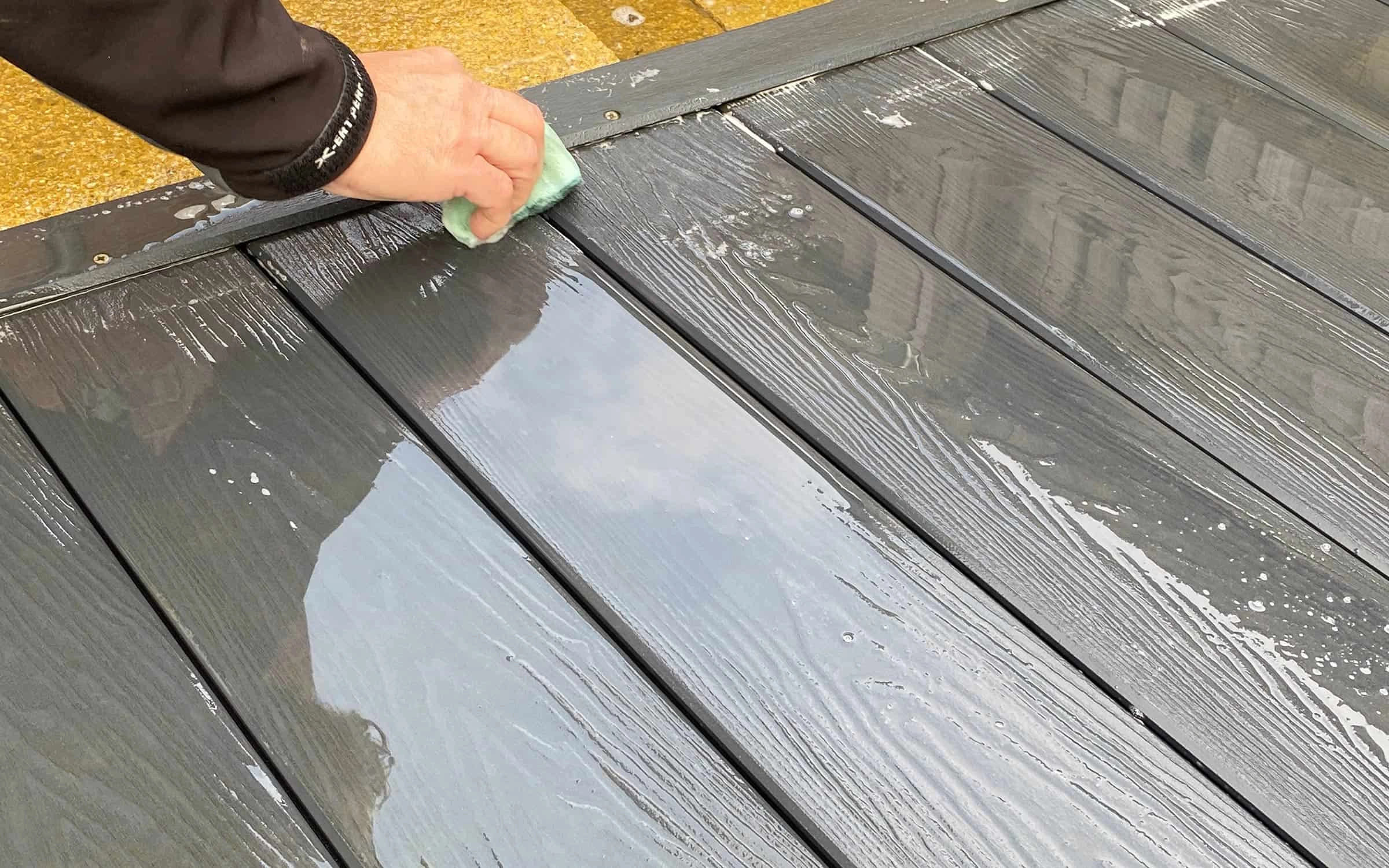
Neotimber
How to lay composite decking
Installing composite decking is a simple process that depends on the area you're working with and whether you want your decking in the sun or shade. It's always a good idea to be prepared when it comes to installation, especially for composite decking.
Before you start thinking about laying composite decking, you should first think about establishing a deck structure for the composite decking. The primary framework for the composite decking subframe will be provided by rows of timber. For all-weather durability, use structurally treated timber when building a framework. However, avoid building wooden frames and joists in rainy weather since, even with treating and damp-proofing, the wood can warp and throw off your measurements.
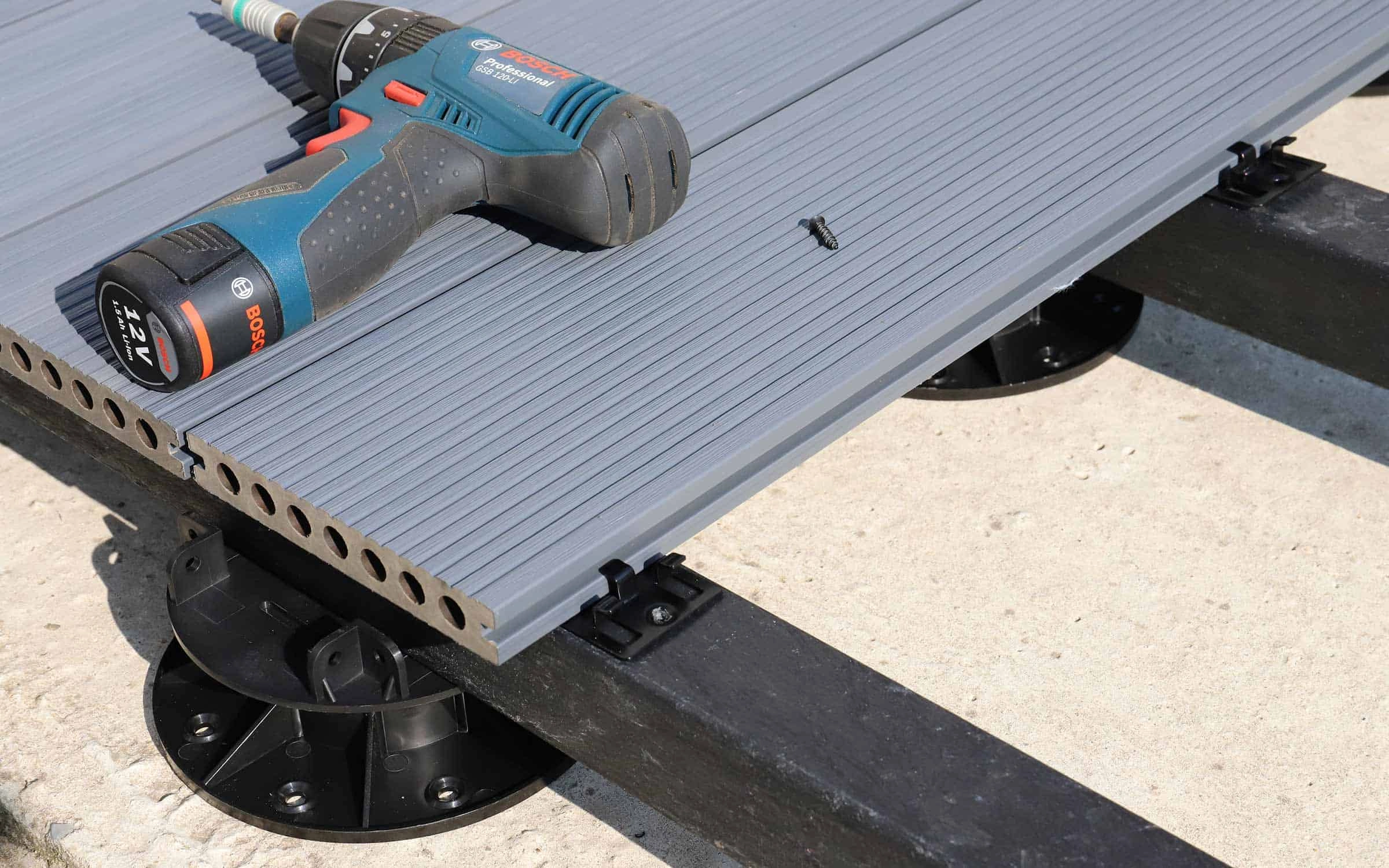
Neotimber
Step 1: Build the Frame
Mark out your layout and dig out the area to level. Add gravel and a membrane to prevent weeds. Use treated timber to form your frame, avoiding installation during wet weather to prevent warping.
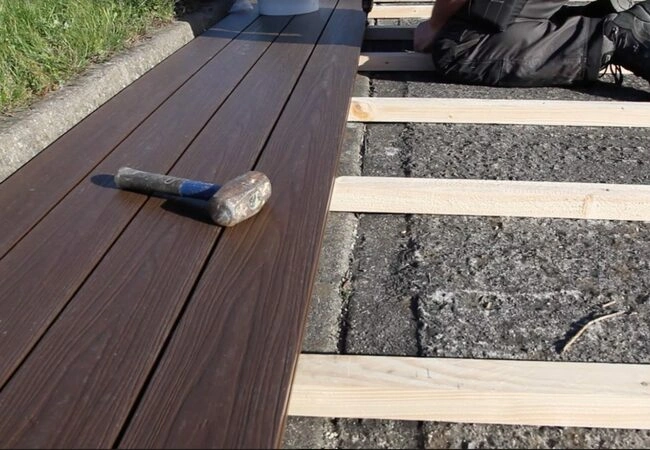
Housebuild
Step 2: Install Joists
- Use joist hangers to keep everything secure.
- Leave 15mm expansion gaps.
- Fix joists with galvanised decking screws or nails.
- Adjust joist spacing based on the direction of your composite decking boards.
Once the frame is solid, lay your composite deck boards following the same principles as timber. Remember to leave expansion gaps and seal any exposed cuts for a polished, long-lasting finish.
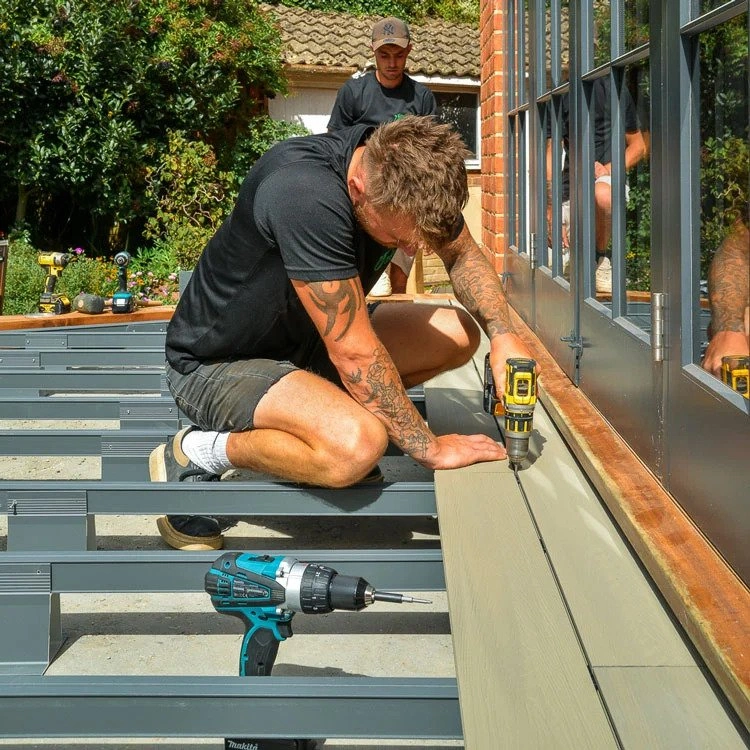
Dura Composites
Final Tips
-
Use a decking calculator to estimate materials before starting.
-
Finish with optional decking lights to create a cosy, atmospheric space.
-
For long-term upkeep, keep decking cleaner, deck stain, and decking oil on hand.
Creating a stunning garden feature doesn’t have to be daunting. Whether you’re laying timber or composite deck boards, choosing between decking paint or natural finishes, or simply learning how to clean decking effectively, this guide provides the practical advice you need to succeed.
If you have any questions on how to lay or clean both regular decking or composite decking or would just like to know some further information about the products we sell at Howarth, please visit your local friendly Howarth branch, or contact our customer services on the number 01472 907051.
In the meantime, you can check out our wide range of decking products on our website, or you can even visit us in branch for more info.
Recent Posts
-
Decking: An Ultimate Guide
Installing decking boards is a fantastic way to transform your outdoor space into a stylish, functio
-
An Ultimate Guide to a Gravel Driveway
If you're considering upgrading your outdoor space, a gravel driveway is one of the most versatile a
